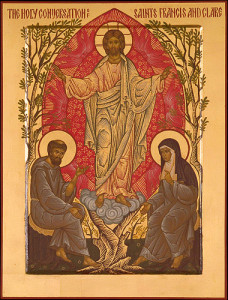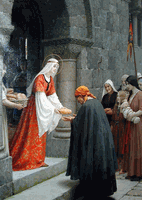PEACE and good to you! I am on the mend and am grateful to each of you for your prayers and good wishes. Thanks so much.
I’d like to focus this month on St. Elizabeth of Hungary who, in her short life, manifested great love for the poor and suffering and has become the patroness of Catholic charities and of our Secular Franciscan Order (OFS). She was the daughter of the King of Hungary. Elizabeth chose a life of penance and asceticism in place of luxury.
She was married to Louis of Thuringia at the age of 14. She had a great love for her husband and bore three children. A Franciscan friar became her spiritual director and this led Elizabeth to a life of prayer, sacrifice and service to the poor and sick. She also wanted to become poor and wore simple clothing. Daily she would bring bread to the poorest in the land, who would come to her gate.
After six years of marriage, Louis her husband died in the Crusades, and Elizabeth was grief stricken. Her husband’s family was looked upon as squandering the royal purse, and threw her out of the palace. The return of the allies of her husband from the Crusades resulted in her being reinstated, since her son was the legal heir to the throne.
In 1228, Elizabeth joined the Secular Franciscan Order. She spent the rest of her years caring for the poor in a hospital she founded in honor of St. Francis. She died before her 24th birthday in 1231. She was canonized four years later.
Here is a list of some suggestions to use for discussion (STUDY GUIDE from “A Woman For Our Time”, whether reading about St. Elizabeth or watching the DVD “A Woman For Our Time” available at TAU CROSS BOOKS AND MEDIA www.taucrossbook.com.
- Read Chap.1 of the SFO rule. Which aspect of the Secular Franciscan way of life most characterized St. Elizabeth? How can we use her example in our ongoing formation and reflection on our Rule?
- What do you think was the greatest challenge Elizabeth and Louis faced in their marriage? How did they overcome it? What similar challenges do we face and how can we overcome them? How did they encourage each other to serve God? Why is this important for husbands and wives?
- Elizabeth helped the poor not just as a private citizen, but, along with her husband, as the ruler of their country. Where does her work line up along the spectrum of Catholic social teaching in this area and is it valuable to us today?
- If your OFS fraternity were to found an association to aid the poor based on Elizabeth’s example what would it be like and what would it do?
- Elizabeth went through some great challenges in her spiritual life as well (such as consciousness of sin, a feeling of abandonment by God, worries about possible complicity with the world). Which do you identity with and why? What can we learn from her about overcoming spiritual difficulties in our lives?
- In what way is Elizabeth a pro-life saint? What does being pro-life involve? What would her pro-life motto be? Could you design a sign or banner based on it?
In the spirit of St. Francis,
Rosie




